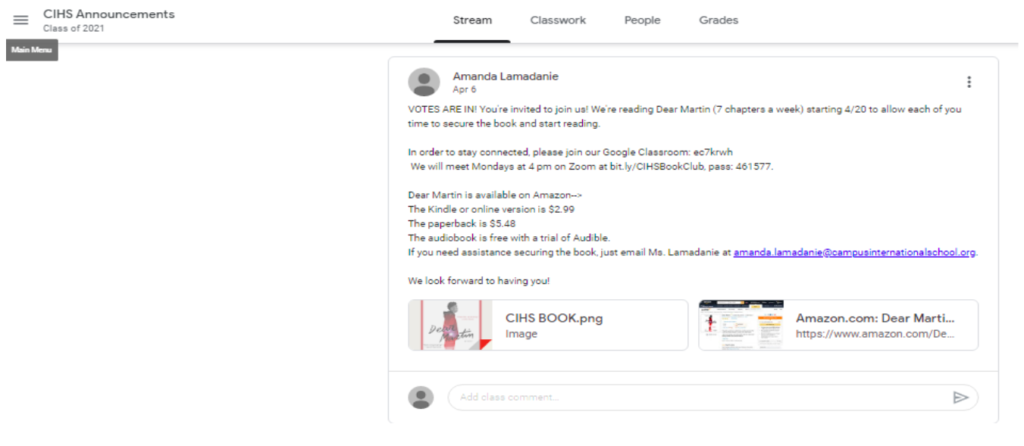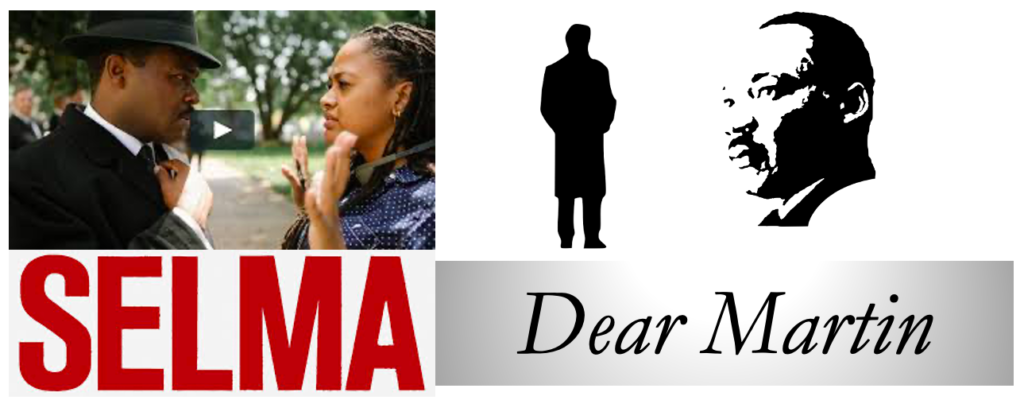Course(s): All-school community book club for students, families, and educators
Department: Language and Literature
Institution: Campus International High School
Instructor(s): Amanda Lamadanie
Number & Level of Students Enrolled: n/a
Digital Tools/Technologies Used: email, Zoom, Google Forms
Author Bio: Amanda Lamadanie teaches 9th and 11th grade language and literature and 12th grade psychology at Campus International High School in Cleveland OH. Additionally, she advises Model UN. She started Campus Connects Book Club in an effort to create space for community and foster reading both for pleasure and critical thinking and social engagement during the quarantine period.
As students at Campus International High School entered into the quarantine period, they expressed a feeling of disconnection and stress as school expectations remained, family responsibilities were added, and opportunities for social connection were reduced.
I created a book club for a community group that I’m a part of to serve similar needs and given my English background, I thought that would be a natural vehicle for connection.
I began by creating an interest form (https://forms.gle/QfbRsg6BEagnzwp46), which I distributed using the Google Classroom announcement spaces that our school maintains for each grade level. I then created a reading preference form based upon what those who signed up were interested in reading (https://forms.gle/WCFsZYbbVFKUSLaRA). Attendees ranked their preferences and I used these responses to determine their first novel, Dear Martin by Nic Stone. The book club met weekly on Zoom. I selected this platform, because this was the platform used to host online classes, and so students were already familiar with it.

This book club included students, parents, and faculty, but it was, first and foremost, a student-led book club. This meant that in addition to students selecting books that they genuinely wanted to read and discuss, at the conclusion of each meeting, I asked for a student volunteer to lead the following meeting, which included planning discussion questions and synthesizing participants’ contributions. The only adult-led meeting was the first, in which I modeled what the role of facilitator could look like.
Meetings began with a 3 minute prompt written on Google Slides, which participants would respond to in the chat, while waiting for everyone to hop on. I would then synthesize their responses and introduce the week’s facilitator who would guide our video discussion by asking questions, prompting responses, synthesizing thoughts, and asking for connections or life experiences related to the topic to be shared. This was an opportunity for students to lead both peers and adults, and students and parents shared that it led to students being more confident in vocalizing their thoughts and stepping into leadership roles within conversations with adults.
Upon the completion of the Dear Martin, we watched and discussed the film, Selma, as the attendees had developed a further interest in Dr. Martin Luther King Jr. based upon their discussions. I hosted the movie viewing by having each member sign into Zoom. We then started streaming synchronously via YouTube, while sharing our reactions in the chat box. At the conclusion of the film, we got back on Zoom to discuss our thoughts and respond to the topics that each member brought up.

Attendees had the desire to continue the book club into the summer, but per a school policy, it has been temporarily paused. The second book students selected is Pride by Ibi Zoboi.
In reflection upon the experience, I appreciate that the book club provided space for voices from all parts of the school community to dialogue around meaningful topics. This brought a diversity of experience that led to rich conversation. I also appreciate that the platform provided a space for students to rise as leaders by facilitating discourse amongst their peers and adults around topics of significance, such as racism and police brutality. One of the unique takeaways from this experience was the power of bringing all types of community members together in dialogue. Hosting a whole community book club with parents, students, and educators was so powerful that it is something that I hope to continue even when we are back to in person courses. This space led to all parties getting to know each others’ ways of thinking and life experiences in depth, which was especially powerful given the diversity of our community and the wisdom that naturally comes through intergenerational gatherings.

Interested in holding your own digital book club? Here are some steps you can take!
- Identify the platform you can most effectively use at your school uses to reach students!
Is it Google Classroom? Email? A newsletter? Student paper? Website? Remind?
- Create and send out an interest survey! Be sure to explain the WHY of your book club when you send it out. A lot of students are feeling isolated and looking for ways to connect with each other while flexing their brilliant brains a bit. I like Google Forms as a platform. In your survey you’ll want to:
- Collect names and contact information
- Collect availability for meetings
- Ask what books and movies students would be excited to read
- Create a book ranking! Again, I like Google Forms for this. You can see how I used the feature that converts your results into a Google Sheet below. I gave values to participants preferences as follows:
- First choice: 3 points
- Second choice: 2 points
- Third choice: 1 point
I then added the values to calculate the most preferred text.
- Choose a platform! How will you meet? Zoom? Google Hangouts? Where will you house your announcements? Remind? Email? Google Classroom?
- Decide on a meeting format. Will your club be teacher-led? Parent-led? Student-led? What does leading look like? What must be done to prepare and how can you position leaders to be successful?
- Announce and start reading!
